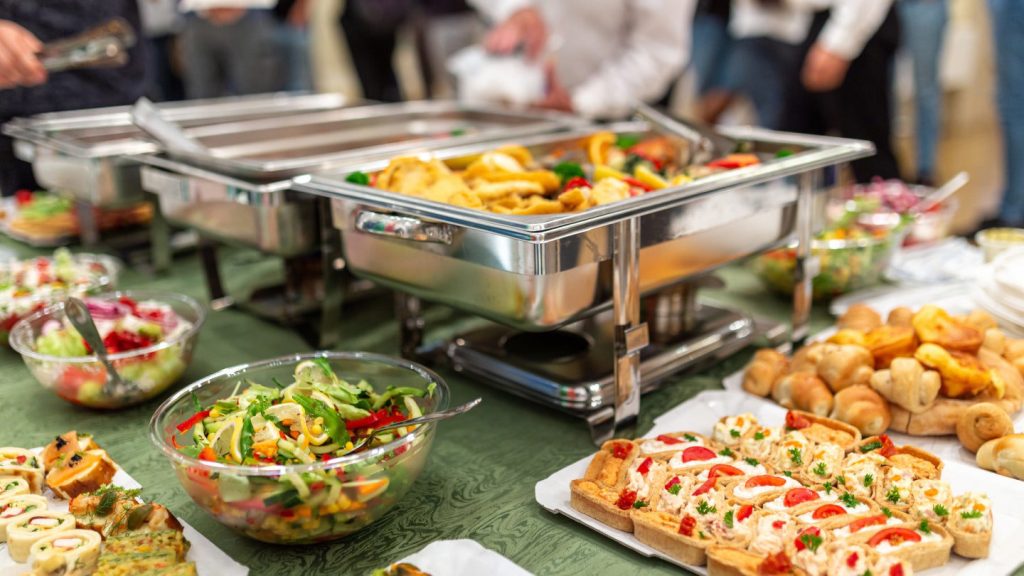Step 1: Choose Your Niche and Define Your Market
Before you invest in equipment or design menus, identify the specific market segment you want to serve. Decide whether you’ll focus on weddings, corporate functions, birthdays, school events, or a mix of all. Determine your food style ,will you specialise in local Zambian cuisine, continental dishes, or healthy and vegan options?
Selecting a clear niche helps you stand out and attract the right clients. It also influences your pricing, branding, and marketing strategy. Study your target market, understand what customers expect, and identify the gaps you can fill.
Step 2: Write a Business Plan Tailored for Zambia
Every successful catering business starts with a solid business plan. It helps you stay organised and gives potential investors or partners confidence in your vision.
Your plan should include:
- Executive Summary: Your business vision, mission, and objectives.
- Market Analysis: The demand for catering services in your area, your target clients, and competitors.
- Products & Services: List of menus and event packages you plan to offer.
- Operational Plan: Staffing, logistics, and kitchen operations.
- Financial Plan: Startup costs, projected revenue, pricing structure, and profitability forecast.
- Marketing Strategy: How you will promote your services and attract clients.
A comprehensive plan is your blueprint for turning an idea into a structured, income-generating business.
Step 3: Register Your Business and Get Legal Compliance
Operating legally is crucial in Zambia’s regulated business environment. Start by registering your business name and structure with the Patents and Companies Registration Agency (PACRA). You can register as a sole trader, partnership, or private limited company.
Next, obtain the required business licences and permits, such as:
- Business Licence: Issued by your local municipal council.
- Food Handling and Health Permits: From your local health department to ensure food safety compliance.
- Tax Registration (TPIN): Register with the Zambia Revenue Authority (ZRA) for tax purposes and VAT if applicable.
- Outside Catering Licence: Required for offering catering at external venues.
Having all your documentation in order builds credibility and prevents legal challenges later on.
Step 4: Set Up Your Kitchen, Equipment, and Supply Chain
Your kitchen setup is the heart of your catering business. Depending on your scale, you can either rent a commercial kitchen, set up your own, or use a shared facility.
You’ll need:
- Cooking equipment: Industrial stoves, ovens, pots, pans, and utensils.
- Storage equipment: Commercial refrigerators, freezers, and shelving.
- Serving equipment: Chafing dishes, food warmers, serving trays, and cutlery.
- Transport: Reliable vehicles or delivery vans to transport food to events.
- Safety equipment: Fire extinguishers, first aid kits, and proper ventilation systems.
Also, establish strong relationships with local suppliers for consistent access to fresh ingredients and quality packaging materials. Good supplier relations reduce costs and ensure steady service.
Step 5: Develop Menus, Pricing, and Service Packages
Your menu defines your brand and must be attractive, cost-effective, and practical to prepare. Design menus that reflect your niche and cater to your clients’ needs.
Tips for creating menus:
- Offer flexibility — include both standard and customised options.
- Highlight local favourites and signature dishes that make your brand memorable.
- Keep an eye on ingredient availability and cost to maintain profit margins.
- Design package deals (e.g., Standard, Premium, and Deluxe) that bundle services for different event sizes and budgets.
- Include optional add-ons like beverages, décor, or waitstaff for additional revenue.
Be transparent with pricing and ensure it covers your production, labour, transport, and overhead costs while remaining competitive.
Step 6: Hire and Train Your Team
Your team is the face of your business. Whether you’re hiring chefs, assistants, or serving staff, focus on professionalism, cleanliness, and customer service.
Consider the following:
- Hire qualified cooks and train them to maintain consistency in food quality.
- Ensure all food handlers possess valid health certificates.
- Provide training in food safety, hygiene, and event etiquette.
- Maintain clear communication systems for event coordination and delivery.
A well-trained team ensures that your service is smooth, reliable, and impressive , all of which lead to repeat business and referrals.
Step 7: Market Your Catering Business and Build a Brand
In today’s digital world, visibility is everything. You can have great food, but without proper marketing, no one will know about your services.
Marketing strategies to use:
- Create a professional brand identity: A clean logo, uniforms, and branded packaging.
- Leverage social media: Platforms like Facebook, Instagram, and TikTok are excellent for showcasing your food and events.
- Build a simple website: Include your menus, contact details, testimonials, and photo gallery.
- Network strategically: Partner with event planners, wedding venues, and corporate clients.
- Use referrals: Encourage satisfied clients to recommend you. Offer loyalty or referral discounts.
- Attend expos and events: Participate in food fairs and trade shows to build recognition.
Branding and word-of-mouth marketing are particularly powerful in Zambia’s close-knit event industry. Consistency in presentation and service quality will make your brand stand out.
Step 8: Manage Growth, Quality, and Scaling
Once your catering business starts gaining traction, focus on maintaining quality while scaling sustainably. Rapid growth without control can harm your reputation.
Key tips for managing growth:
- Track your expenses, profits, and client feedback to guide decision-making.
- Introduce standard operating procedures (SOPs) for preparation, delivery, and service to maintain consistency.
- Invest in better equipment and staff training as your business expands.
- Diversify by adding related services such as décor, event planning, or equipment hire.
- Maintain strong quality-control measures — hygiene, taste, and presentation must never slip.
- Build long-term partnerships with venues, corporates, and institutions for steady bookings.
Successful catering businesses grow through reputation, reliability, and reinvestment — not just through volume.
Conclusion
Starting a catering business in Zambia is a promising venture when approached strategically. The country’s vibrant event culture ,from weddings to corporate functions ,creates strong demand for reliable caterers.







